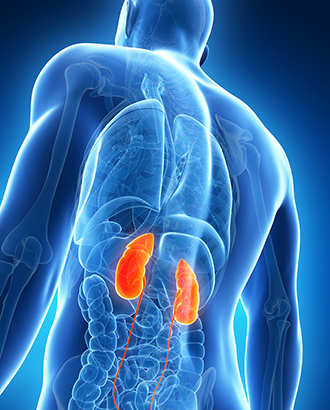
DIABETIC KIDNEY DISEASE OVERVIEW
Having diabetes puts you at risk of other health problems, including heart attacks, strokes, vision loss, nerve damage, and kidney disease. While all of that may sound overwhelming, there is some good news; many of the steps you need to take to prevent one of those complications may actually help to prevent them all.
People who develop diabetic kidney disease usually have no symptoms early on, although the condition puts them at risk of developing more serious kidney disease.
The kidneys play an important role in the body: they filter the blood, removing waste products and excess salt and water. If the kidneys become diseased, they can not perform their task, leaving the blood polluted.
Finding out that you have early diabetic kidney disease can alert you that your kidneys are in danger. It is important to take steps to protect your kidneys before the problem advances.
In some cases, diabetic kidney disease can eventually cause the kidneys to stop working altogether. If that happens to you, you will need to have a kidney transplant or dialysis, a procedure that filters the blood artificially several times a week.
DIABETIC KIDNEY DISEASE SYMPTOMS
Diabetic kidney disease usually causes no symptoms until at least 75 percent of your kidneys’ function is lost, and people who have the condition often produce normal amounts of urine. To detect diabetic kidney disease, health care providers rely on tests that measure protein levels in the urine and blood tests to evaluate the level of kidney function.
When the kidneys are working normally, they prevent protein from leaking into the urine, so finding protein in the urine is a sign that the kidneys are in trouble. Often people who have diabetic kidney disease also have high blood pressure.

DIABETIC KIDNEY DISEASE RISK FACTORS
Having a family history of kidney disease can increase your risk of diabetic kidney disease. Although you cannot do anything to change your family history, there are several factors that increase your risk of developing diabetic kidney disease that you can change. These include:
- Having poorly controlled elevated blood sugar levels
- Being overweight or obese
- Smoking
- Having a diabetes-related vision problem (diabetic retinopathy) or nerve damage (diabetic neuropathy)
DIABETIC KIDNEY DISEASE DIAGNOSIS
Urine tests are recommended once per year in people with type 2 diabetes, starting at the time of diagnosis.
The urine test is looking for a protein called albumin. If there is a very large amount of albumin (protein) in your urine, it means you have diabetic kidney disease. You may be told that you have “microalbuminuria” or “moderately increased albuminuria”. That simply means that you have trace amounts of protein in your urine, but it still means that you are at risk for getting diabetic kidney disease, assuming you do not have kidney disease caused by another condition.
This same test will also be used to monitor your condition over time.
DIABETIC KIDNEY DISEASE COMPLICATIONS
The key complication of diabetic kidney disease is more advanced kidney disease, called chronic kidney disease.
Chronic kidney disease can, in turn, progress even further, eventually leading to total kidney failure and the need for dialysis or kidney transplantation.

DIABETIC KIDNEY DISEASE TREATMENT
People with diabetes must focus on keeping their blood sugar levels in the right ranges. This is the most important thing that you can do to prevent diabetic kidney diseade and prevent its worsening. It is also equally important to control the blood pressure. That’s because high blood sugar and high blood pressure work in concert to damage the blood vessels and organ systems. For these reasons, the most important things you can do to stall kidney disease and protect against other diabetes complications are to: Make healthy lifestyle choices Keep your blood sugar as close to normal as possible Keep your blood pressure below 140/90, if possible
DIABETIC KIDNEY DISEASE TREATMENT
People with diabetes must focus on keeping their blood sugar levels in the right ranges. This is the most important thing that you can do to prevent diabetic kidney diseade and prevent its worsening.
It is also equally important to control the blood pressure. That’s because high blood sugar and high blood pressure work in concert to damage the blood vessels and organ systems.
For these reasons, the most important things you can do to stall kidney disease and protect against other diabetes complications are to:
- Make healthy lifestyle choices
- Keep your blood sugar as close to normal as possible
- Keep your blood pressure below 140/90, if possible
Lifestyle changes
Changing your lifestyle can have a big impact on the health of your kidneys. The following measures are recommended for everyone, but are especially important if you have diabetic kidney disease:
- Limit the amount of salt you eat.
- If you smoke, quit smoking
- Lose weight if you are overweight.
